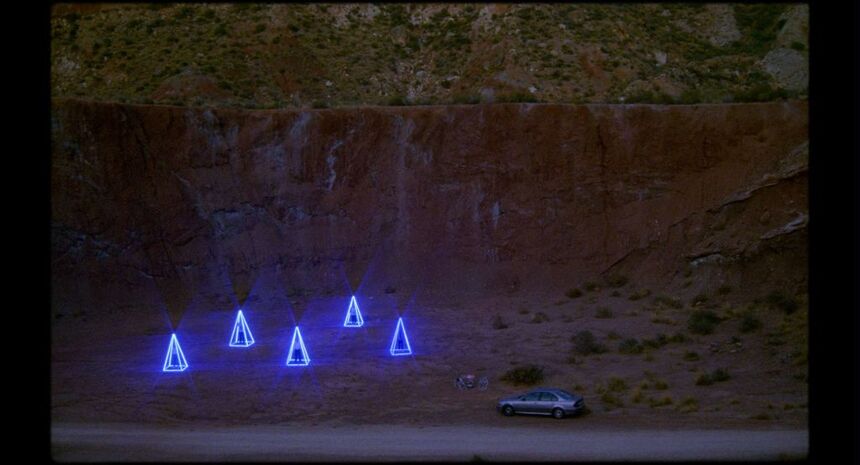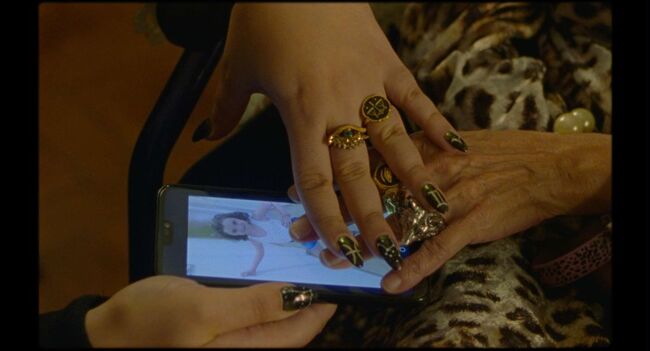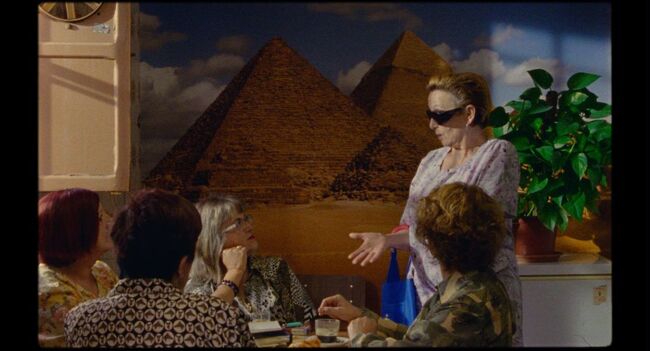Locarno 2021 Review: THE SACRED SPIRIT, A Spanish Quirky Tragicomedy with a Greek New Wave Flavor

Spanish emerging filmmaker Chema García Ibarra unveiled his first feature-length offering The Sacred Spirit in the international competition of the Locarno Film Festival.
His previous works were, in his description, "home-made science-fiction" shorts shot with non-professional actors. Ibarra preserves this essence in his feature debut. He has said that the making of the film unspooled in a family environment and atmosphere.
The Sacred Spirit was shot in the director's hometown of Elche, with locals starring in leading and supporting roles. In a way, The Sacred Spirit is a surreal collective portrait of the place, framed by a disturbing story tackled in a deadpan style. Ibarra opens the film with a small child reading her essay on baptism in front of a class that takes a dark turn a way too soon. The child, Veronica, proposes that priests should be always in the hospital to be ready to baptize every newborn, because the organs of baptized children are of no use to devil-worshipping organ collectors.
With no context, the claim from such a small child sounds disturbing, though the combination of childhood innocence and implicit gruesomeness of the statement can fuel a cynical smirk in the audience. Ibarra switches the lanes of cynical, horrifying, and ludicrous in a stealthy manner and with low registers. It is frequently hard to decipher when is he having a laugh and when he is serious, which makes the viewing experience of The Sacred Spirit all the more interesting, along with the observations of local quirks.
As it soon transpires, Veronica is a twin sister of a missing child, Vanessa, who is suspected to have been kidnapped by a gang of organ harvesters. While Ibarra follows, the desperate mother of both children, Charo, gives an interview to local news in order to boost up the visibility of her case. The director soon veers off the criminal premise to focus on Charo's brother, José Manuel, who runs a local café.
José Manuel stays with his mother, once a popular local clairvoyant, now hardly communicating as she suffers from advanced Alzheimer's. The interest in esoteric and supernatural has been passed from mother to son, as José Manuel is active in the local ufology association Ovni-Levante. After the leader of Ovni-Levante Julio suddenly dies, José Manuel is the only one who knows what to do for the upcoming transformational event for mankind. In a sly detour, Ibarra makes José Manuel's mission the main focus of the story, gently sidelining the mystery of his missing niece to a supporting plotline.
The Sacred Spirit centers on a group of misfits who chose to believe in transcendental and astral transformations by extra-terrestrial civilizations. José Manuel, feeling to be chosen to continue in the mission started by their leader, continues like a robot to carry out the instructions, unbaffled by the sudden appearance of the dead leader incarnated into another civilian. José Manuel becomes the oddball, determined to fulfill the astral quest as his complete detachment from common sense and normal reasoning becomes a humungous red flag.
Ibarra´s film lies in a convergent point of several organically connected narrative threads. José Manuel's indoctrination remains the most dominant one, which is seconded by the investigation about his missing niece and his desperate sister Charo and mixed with a very subtle strand revolving around the paranoia-inducing rumor of an organ-harvesting mafia operating in the town, spread by local women. The criminal premise from the first act will make a comeback in the third act and even in a more shocking way than expected. While the mystery of missing children bookends the film, Ibarra makes the place another character, making the film a strange love letter to Elche.
The Sacred Spirit dabbles in a current topic, capturing a handful of aficionados of non-mainstream belief, acting upon the belief without disputing the circumstances. By the time of the big reveal, why Vanessa went missing and who was the culprit, which Ibarra pulls in an off-handed fashion, setting up the scene for even a more sickening gut punch, the story became a parable on the current social phenomenon of radicalization.
The radicalization is fuelled by strange theories and claims that craftily turns harmless people into instruments of a sinister agenda, useful fools in a scheme governed by twisted motifs and depraved needs. More importantly, The Sacred Spirit does not ring any didactic notes; Ibarra's sophisticated and subtle approach extends to plotting and the story.
The austere aesthetics, dark and quirky narrative, and the deadpan comedy make The Sacred Spirit appear as if the film emerged from the Greek New Wave. The invisible bond to the Greek cinema is even more supported by the formalism of Ion de Sosa's cinematography, with a meticulous framing of sun-washed images shot on 16mm and economic and fixed camerawork.
Despite the similarities, Ibarra is not emulating Lanthimos and co. but crafted an original auteur vision with a style that puts a different spin on tragicomic. That is one of the reasons why Ibarra's The Sacred Spirit became the standout in this year's Locarno lineup.
Esp�ritu sagrado
Director(s)
- Chema García Ibarra
Writer(s)
- Chema García Ibarra
Cast
- Llum Arques
- Nacho Fernández
- Rocío Ibáñez









